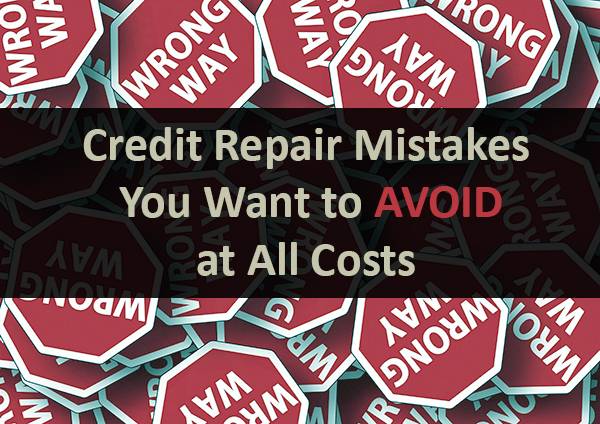Credit Repair Mistakes You Want to Avoid at All Costs

So you’ve decided to fix your credit…fantastic!
But did you know that there are things that you could be doing right now that are actually sabotaging your efforts.
Don’t get caught in this trap.
Here are the most common credit repair mistakes:
1. Not Checking Your Credit Report
Some people make the mistake of not checking their credit report, because they think it will negatively impact their credit score.
According to Equifax…
When you order a copy of your credit report, you trigger what’s known as a soft inquiry. Soft inquiries are also made when a credit card company offers you a pre-approved credit card for which you did not apply. In both of these cases, the inquiry does not impact your credit score.
Hard inquiries, on the other hand, do impact your credit score. A hard inquiry is triggered when a creditor with whom you have applied for credit pulls a copy of your credit report.
In general, inquiries will stay on your credit report for two years, with only the hard inquiries factoring into your credit score. via: Eight Things You Don’t Know About Your Credit Score
Checking your credit report for errors is an important part of the credit repair process. If you are avoiding this step you may be missing something that is already affecting your score.
To Your Credit Score?
Download Our Free Checklist and Get Back On Track
A 2013 Federal Trade Commission study revealed that one in five consumers had an error on at least one of their credit reports — and these errors can seriously affect your credit score.
2. Closing Old Accounts
In the world of credit scoring, age is a virtue. While you might think closing an old and unused account is wise, its impact could negatively affect your score by increasing your credit utilization ratio.
For example, suppose you have two credit cards, each with a $10,000 limit. Card A carries a zero balance, and Card B has a balance of $3,200. You decide to close Card A since you never use it, effectively losing $10,000 in available credit and raising your overall utilization ratio from 16 percent to 32 percent. Breathe life into your score by keeping your accounts current and active. via: 6 Ways You’re Sabotaging Your Credit Repair Efforts
In some cases however, closing an account may still be something that you want to do. This is especially true if it is costing you money to have a card that you do not need or use. However, before canceling try to negotiate a better solution with the provider.
And never close a card before making a major purchase. Jenna Lee, from U.S. News, says, “When applying for a mortgage or auto loan, you want your score to be as high as possible so you can score the lowest interest rates. Plan ahead.”
3. Don’t Max Out Your Cards Before a Bankruptcy
There is a common myth that you can charge up your credit cards before filing for bankruptcy. In fact, some people have done this purposely thinking that it is an easy way to get rid of their debt while being able to keep what they have purchased. Think twice before doing this.
Most of us cringe at the idea of not making good on our financial responsibilities. But if you’re contemplating bankruptcy, you may have been counseled to put certain charges or expenses on a credit card in the anticipation that you’re going to soon wipe the debt out in bankruptcy court. But tread very, very carefully here. When creditors see that you’ve maxed out your cards or made big charges just prior to declaring bankruptcy, they may try to challenge your bankruptcy filing in court. And a bankruptcy judge may just reject your petition, leaving you on the hook for that credit card debt. via: 10 Common Credit Mistakes
Rebecca McDowell says, “…if you use your credit cards excessively knowing you intend to file bankruptcy, the credit card company can accuse you of fraud and take steps to make sure you still have to repay the debt…Under federal bankruptcy law, credit obtained by “fraudulent means” can be deemed nondischargeable.”
4. Paying Charged-Off Debts
Everyone feels pressured when they are harassed by collections agencies, and you may be tempted to simply pay the amount they are asking for. However, it may surprise you to learn that paying collections agencies will often do nothing for your credit. The fact that a charged-off debt is included in your credit history will do the same amount of damage whether the debt is paid or unpaid.
Rather than paying the debt, you can stop the harassing calls of a collection agency by requesting debt validation. According to the Fair Debt Collection Practices Act, you have 30 days from the time that a collector contacts you to send a written request for validation of the debt. The collection agency must stop all attempts to collect, verify the debt information with the creditor, and mail you the verification before they can resume their attempts. via: 5 Credit Repair Mistakes to Avoid
5. Don’t Put Major Expenses on Credit Just for “Rewards.”
An all too common mistake that many people make is putting large purchases on a credit card just to get the rewards points.
People have been known to charge all kinds of things — lavish vacations, cars, boats, diamond jewelry and more — all to rack up miles, points and other rewards from their credit card companies. Unless you’re 100 percent sure that you can immediately write a check for such charges and pay off your balance in full, making those large purchases on a card is a big no-no. Whatever benefit you get in terms of frequent-flier miles or hotel stays will be offset by interest charges you’ll pay if you don’t pay it off at the end of the month. via: 10 Common Credit Mistakes
Closing Thoughts
Fixing your credit will certainly simplify your life in many ways. But make sure you do your homework. It’s easy to make mistakes even when your intentions are in the right place. The problem is that these types of mistakes can cause more damage to your credit score.



Leave a Reply